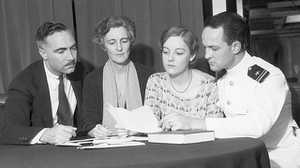Hawaiians Remember: Nanette Napoleon

Nanette Napoleon, a researcher and writer from Kailua, Oahu, specializes in the history and cultures of Hawai'i. She is the author of Oahu Cemetery Burial Ground and Historic Site and is the director of The Cemetery Research Project. Her grandfather served on the jury at the trial of Grace Fortescue, Tommy Massie, and two other Navy men for Joseph Kahahawai's murder.
Racial Tensions
The Navy took so much control of this case and blitzed the mainland media with their own version of what was going on prior to the case, and during the case. And their slant was, "oh yes, there's these darkies lurking in every corner who were preying on the white people in the community." And that's what went out in the media across the country. It made headlines across the country.
But in fact, Hawai'i was very peaceful at the time. Yes, there was some, a little bit of racial tensions between the naval personnel, or military personnel, and local folks. But that happens everywhere where there's a large military presence, and it wasn't anything that was exceptional. In fact, it was fairly peaceful. I mean Hawaiian, local people took Navy people into their homes all the time. So it got blown way, way out of proportion across the country, and sadly that was the image that most people had about Hawai'i and local people.
A Threat to Statehood
Hawai'i had been trying to get statehood, seriously, from 1900 after. And so this was a big drawback for that -- put a big black eye on the statehood movement -- because now people in Washington were looking at Hawai'i and going, "Oh well they're out of control, we shouldn't grant statehood for them. They don't know how to run the police, [it's] inept. There is no security for white people. If we open statehood and more whites move in there's going to be lawlessness, and how can we let that happen." So there was a lot of concern, a lot of serious concern that it would stop statehood forever. But luckily it didn't, and the statehood movement went on, and in 1959 statehood was granted.
Injustices Today
If the Massie case happened today the whole Hawaiian community would be up in arms. I don't think it would ever happen today to that level. I think there are still injustices going on in the community on the criminal level, or I guess you would say, judicial level. Many more Hawaiians are accused of crimes in our community, far more than any other ethnic group. So that still goes on, but not to the extent that happened during the Massie case. It was so blatantly ethnically driven. I don't think that would ever occur today. And if it did the Hawaiian community would be protesting. There would be riots in the street, I think.







